
I recently bought myself the latest must-have luxury in-car accessory – a travel mug. Vacuum sealed, I could enjoy my favourite hot drink for an entire journey. Knowing I would be driving quite a bit that week I decided to give it a whirl on my way to a day conference at Oak Hill College. I decided to baptize it with some really strong Arabic coffee with cardamom seeds purchased in Jerusalem. High in caffeine there is nothing that will kick-start you faster in the mornings.
The aroma itself is quite intoxicating – in an entirely legal sort of way. In the stop-go traffic of the M25 I began to enjoy the fragrant aroma of my Arabic coffee with cardamon seeds. With around a hundred or so other clergy attending from right across England I had decided that on such an important day I should wear one of my nicest jackets, a white shirt and brown trousers. I did indeed make quite an impression. Unfortunately I discovered belatedly that the momentum of driving in one direction can cause liquid refreshments to drive in another direction. While I did indeed enjoy the taste of some of the coffee, some of it also left me with really quite impressive coffee stain down my white shirt as well. It could easily have been mistaken for dried blood from a wood chopping incident had it not been for the fragrant aroma of Arabic coffee with cardamom seeds. My lesson for the day? Everyone could tell I had been driving, and not very well.
Everyone of us is driven by something. Is it as obvious to everyone else as a coffee stain? What is driving your life? Is it fear? Is it anger? Is it remorse? Is it ambition? The desire to please? The accumulation of possessions? A few years ago we examined what the scriptures teach about the Purpose Driven Life. We saw why Rick Warren’s book has become so popular. Rick identifies five main purposes that God intends to be a driving force in our life.
1.We were planned for God’s pleasure – to know him and love him;
2.We were formed for God’s family – to find a home and family;
3.We were created to become like Christ – with love, joy, peace, patience, kindness, goodness, faithfulness, gentleness and self control;
4.We were shaped for serving God – with a unique mix of talents, skills and passion; and
5.We were made for a mission – to introduce other people to God’s five purposes for their lives too.
Without a God-given purpose to shape our life, we become driven by destructive influences for we are all motivated by something. Here are three of the most common forces that drive people. People are:
1.Driven by Guilt and Fear
Many people are unable or unwilling to forget what lies behind. They are unable to hide from their past. The Apostle Paul had every reason not to forget his past either. As we saw last week, he writes, “As for zeal, persecuting the church” (Philippians 3:6). He had hunted down Christians, he had supervised their arrest. He had prosecuted them and even approved their execution. “Guilt-driven people are manipulated by their memories” so that “their past controls their future”. But even though “we are products of our past” … “we don’t have to be prisoners of it.” God’s purpose is not limited by our past. His purposes are not neutralized by the mess we make of life.
God promised through Jeremiah to his wayward people, “For I know the plans I have for you … plans to prosper you and not to harm you, plans to give you hope and a future.” (Jeremiah 29:11). God is concerned with your future not your past. Without a God-given purpose for the future many people are driven by guilt & fear from the past. That is why Paul insists, ”Forgetting what is behind … I press on toward the goal.” (Philippians 3:13). We must forget the past and look to the future. Secondly, many people are:
2. Driven by Anger and Resentment
Holding on to hurts is incredibly destructive. If we don’t forgive and forget, we will remember and resent. “Resentment driven people either ‘clam up’ and internalize their anger or ‘blow up’ and shower others with the fall-out.” Anger always hurts. Paul writes with sadness about some who were once friends:
“For, as I have often told you before and now say again even with tears, many live as enemies of the cross of Christ. Their destiny is destruction…” (Philippians 3:18-19).
If we do not forgive, Jesus warns, God will not forgive us. Forgiveness is at the heart of the gospel – it is the purpose of the cross. To not forgive is to turn our backs on Jesus and what he has done for us. In Philip Yancey’s book What’s so Amazing about Grace? he writes “Not to forgive imprisons me in the past and it locks out all of the potential for change.” Resentment always hurts you more than the one resented. “While the one in the wrong has probably forgotten what it was that offended you, you will continue to stew in it, chained to the past.” Rick Warren says, “Listen: Those who have hurt you in the past cannot continue to hurt you now unless you hold on to the pain through resentment. Your past is past! Nothing will change it. You are only hurting yourself with your bitterness.”
God promised through Jeremiah “Then you will call upon me and come and pray to me, and I will listen to you. You will seek me and find me when you seek me with all your heart.” (Jeremiah 29:12-13). Instead of crying out against others in rage, give them over to him. He will listen. He can take it. Seek him and you will find him. Forgive and you will be forgiven. For to forgive is also to forget. To “forget” in the Bible means “no longer to be influenced by”. In Hebrews 10:17 the Lord promises
“Their sins and lawless acts I will remember no more.” That doesn’t mean God has a bad memory! It means He forgives our past as if its forgotten.
That is why we should not keep looking back. When Paul urges us to forget the past, he means that we are to break the power of the past by living for the future. We cannot change the past, but Jesus has changed the consequences of our past. Driven by guilt and fear, driven by anger and resentment. Thirdly many people are
3. Driven by Wealth and Materialism
The desire to acquire can so easily become a consuming passion. The drive to want more comes from the mistaken belief that ‘more’ will make me more happy, more important, more secure. The truth is the very opposite. Possessions only provide temporary happiness. I know. I’ve only ever owned one new car in my life. Actually I only owned 50% of the car – the other half belonged to a charity. But at least I told myself that my half was the visible half. It was a metallic blue Nissan Prairie, with sliding doors. And it drove like a van. But I confess that it did make me feel good driving the kids to school on that first day in a shiny new car, with my arm out of the window and with a smile on my face as if to say ‘look at me…’ The fun lasted precisely 11 months and 29 days until… the new registration plate came out and my new car became just a used car. If you want to own the latest registration plate you have to change your car every six months now… The fact is, “Self worth and net worth are not the same. Your value is not determined by your valuables … God says the most valuable things in life are not things …
Real security can only be found in that which can never be taken from you – your relationship with God.” John Stott writes: ‘Certainly no one can know himself until he has honestly asked himself about his motives. What is the driving force of his life? What ambition dominates and directs him? Ultimately there are only two controlling ambitions, to which all others may be reduced. One is our own glory, and the other, God’s.’
As we saw last week, that is why Paul says, “But whatever was to my profit I now consider loss for the sake of Christ. What is more, I consider everything a loss compared to the surpassing greatness of knowing Christ Jesus my Lord, for whose sake I have lost all things. I consider them rubbish, that I may gain Christ.” (Philippians 3:7-8)
Paul counted the best the world could offer as rubbish compared to knowing Jesus. His life had become purpose driven. Three destructive things that drive many people : People driven by guilt and fear, driven by anger and resentment; driven by wealth and materialism. In Philippians 3, Paul offers a much more worthwhile motivation : the God-given purpose driven life. This is how he describes it:
“I want to know Christ—yes, to know the power of his resurrection and participation in his sufferings, becoming like him in his death, and so, somehow, attaining to the resurrection from the dead.Not that I have already obtained all this, or have already been made perfect, but I press on to take hold of that for which Christ Jesus took hold of me. Brothers, I do not consider myself yet to have taken hold of it. But one thing I do: Forgetting what is behind and straining towards what is ahead, I press on towards the goal to win the prize for which God has called me heavenwards in Christ Jesus.” (Philippians 3:10-14)
There are at least five benefits from living a purpose-driven life contained in this passage.
1. Knowing your purpose gives meaning to your life
Paul writes: “I press on to take hold of that for which Christ Jesus took hold of me.” (Philippians 3:12).
“Without God, life has no purpose, and without purpose, life has no meaning. Without meaning, life has no significance…” The greatest tragedy is not death. The greatest tragedy is to live without a purpose.
That is a life sentence. We were made to have meaning. “I know the plans I have for you” God promised through Jeremiah. The initiative is all from God. Paul’s life had been transformed because the grace of Jesus had taken hold of him. This is why Paul can be so emphatic “I want to know Christ and the power of his resurrection, and the fellowship of sharing in his suffering.” (Philippians 3:10). Jesus had shown Paul love and forgiveness in friendship. Jesus had given Paul meaning and hope, a new purpose for living. “Hope is as essential to your life as air and water. You need hope to cope.
Dr. Bernie Siegel found he could predict which of his cancer patients would go into remission by simply asking, “Do you want to live to be one hundred?” Yes or no? Those with a deep sense of life purpose answered ‘yes’ and were the ones most likely to survive. Hope comes from having a purpose.” Knowing your purpose gives meaning to your life
2. Knowing your purpose simplifies your life
Paul writes, “But one thing I do.” (Philippians 3:13). One thing. One. “One thing you lack” Jesus says to the rich young man in Mark 10. “Only one thing is needed” Jesus has to say to over worked and hyper-critical Martha in Luke 10. “One thing I know” cries the man who had received his sight by the power of Christ, in John 9. Often we are involved in too “many things”. Only one thing matters. God’s purpose for you today – this moment. No athlete succeeds by doing everything.
They succeed by specializing. On Monday I met Josh Salzmann in the changing room at Wentworth. Josh is the director of fitness at Wentworth. He has a physique many men would die for. The secret is exercise. To concentrate on “one thing,” – to be purposeful, intentional, focused. Paul is single-minded about his ambition. “One thing I do”. This does not mean he neglected every other area of his life. Rather it means that all else was subordinated to his goal. Without a clear purpose we lack the foundation on which to base our decisions, allocate our time, or use our resource.
Life becomes cluttered with choices made based on circumstances, pressures, and emotions. Not knowing our purpose leads to overwork, to stress, fatigue and tension. On the other hand, knowing your purpose simplifies your life because, “It defines what you do and what you don’t do. Your purpose becomes the standard you use to evaluate which activities are essential and which aren’t.” I regularly remind myself that it is impossible to do everything people want me to do. I have just enough time to do God’s will. If I can’t get it all done, it means I am trying to do more than God intended for me to do or just fiddling with my computer. Rick Warren says wisely, “Purpose-driven living leads to a simpler lifestyle and a saner schedule.” Knowing your purpose gives meaning to your life. Knowing your purpose simplifies your life
3. Knowing your purpose focuses your life
“I do not consider myself yet to have taken hold of it. But one thing I do: Forgetting what is behind and straining toward what is ahead.” (Philippians 3:13)
Paul is describing the athlete stretching out, straining every muscle as he goes flat out for the finish. He brings to mind the striking image of Eric Liddell, the Olympic runner whose story was retold in the film Chariots of Fire, chest out, head held high, legs and arms pumping furiously as he tore down the back straight to the finish to win the Olympic gold medal.
When he was criticized for spending so much time training as a runner instead of becoming a missionary, he said “I believe God made me for a purpose, but he also made me fast. And when I run I feel His pleasure.” Do you? Do you feel his pleasure knowing you are fulfilling your purpose? Paul isn’t saying “I’ve arrived” but he does say “I don’t look back.” That’s because one of the rules of running is that you don’t look back.
When you’re in the middle of a race you don’t look over your shoulder, because when you do, it can throw off your confidence if you see somebody gaining on you. It can throw off your step so that you slow down. You will lose your balance. You could fall. There’s no reason to look back. As a runner, you’re focused only on the finishing line. You cannot focus on what is ahead and turn your head at the same time. Take your eyes off Jesus and you will focus on other people and what they have or have not done. Focus on Jesus and his love and everything is put in its right perspective.
Here’s a test: Lee Strobel once said, “If you can’t sing ‘Amazing Grace’ with tears in your eyes–or at least in your heart–then you really don’t understand what it means.” Does the grace of God drive your life? Does it grip you? Does it motivate you?
Knowing your purpose gives meaning to your life.
Knowing your purpose simplifies your life
Knowing your purpose focuses your life
4. Knowing your purpose motivates your life
“I press on towards the goal to win the prize for which God has called me heavenwards in Christ Jesus.” (Philippians 3:14)
This is purpose produces passion. Nothing energises more than having a clear purpose. “On the other hand, passion dissipates when you lack a purpose.” Rick says, “Just getting out of bed can become a major chose. It is usually meaningless work not overwork that wears us down, saps our strength, and robs our joy.” We won’t become a winning athlete by listening to lectures, watching movies, reading books, and cheering at the games. An athlete is not distracted by cream buns or heckling bystanders.
They win by getting on to the track, practising hard and determining to win. Hebrews tells us “Therefore, since we are surrounded by such a great cloud of witnesses, let us throw off everything that hinders and the sin that so easily entangles, and let us run with perseverance the race marked out for us. Let us fix our eyes on Jesus, the author and perfecter of our faith.” (Hebrews 12:1-2)
Jesus is the author and finisher of our faith. He started the race for us and he will finish it with us. We are not alone. He is with us by his Holy Spirit. There is no greater motivation than discovering the purpose for which you were created. Knowing your purpose gives meaning to your life, it simplifies your life, it focuses your life and it motivates your life. Finally,
5. Knowing your purpose prepares you for eternity
“I press on towards the goal to win the prize for which God has called me heavenwards in Christ Jesus.” (Philippians 3:14) “Many people invest their entire lives building up a legacy on earth.” Its all for the children they rationalize. “They want to be remembered when they’re gone.” They want to be immortalized so we name roads after them. Think of the names of some of the roads in Virginia Water. Simon’s Walk, Cabrera Avenue, Wellington Avenue, Stuart Way. “what ultimately matters most will not be what others say about your life but what God says… because all achievements are eventually surpassed, all records are one day broken, all reputations eventually fade, all tributes are soon forgotten, and even road names can get changed.
I’m sure you have heard of Dr James Dobson. He recently retired as Founder and President of Focus on the Family. “In College, [the young] James Dobson’s goal was to become the school tennis champion. He felt proud when his trophy was prominently placed in the school’s trophy cabinet. Years later, someone mailed him that trophy. They had found it in the rubbish bin when the school was remodeled. Jim says “Given enough time, all your trophies will be trashed by someone else.”
Living to create an earthly legacy is a short-sighted goal. How much wiser to build an eternal legacy. You were not put on earth to be remembered. You were put here to prepare for eternity. “I press on towards the goal to win the prize for which God has called me heavenwards in Christ Jesus.” (Philippians 3:14).
C.S. Lewis put it like this: “Aim at heaven and you will get earth thrown in. Aim at earth and you get neither.” “One day you will stand before God, and he will do an audit on your life, a final exam, before you enter eternity.” As the Apostle Paul says, “For we will all stand before God’s judgment seat … So then, each of us will give an account of himself to God.” (Romans 14:10,12). The good news is that God wants you to pass the test. He has given us the questions in advance. What will those questions be?
1. What did you do with my Son, Jesus Christ?
God is not interested in our religious background or our religious views. The only thing that will matter is this – Did you receive Jesus as your Lord and Saviour? Did you learn to love him? Did you learn to trust him? Did you choose to follow Him? Jesus says “I am the way and the truth and the life. No one comes to the Father but by me.” (John 14:6). What did you do with my Son? Second question:
2. What did you do with what I gave you?
How did you invest the time, the skills and the money I entrusted to you? What did you make of the opportunities, the energy, the relationships I created for you. Did you spend them on yourself? Or did you invest them for me and my purposes? Preparing you for these two questions is the purpose of this Church and everything we stand for – “to know Christ and make him known”. Rick Warren says “The first question will determine where you spend eternity. The second question will determine what you do in eternity. So what is the driving force of my life? What would other people say it is? What do I want it to be?” For one day soon, the driving force of your life will become as visible and as obvious as the coffee stains were on my white shirt. Want to know what drives me?
“I want to know Christ and the power of his resurrection and the fellowship of sharing in his sufferings… I press on toward the goal to win the prize for which God has called me heavenwards in Christ Jesus.” (Philippians 3:10, 14)
Lets pray.
Dear Lord, help me discover your purposes for my life so that I might know you, love you and faithfully serve you all the days of my life, so that one day I may hear you say, “We’ll done, my good and faithful servant.” In Jesus’ name. Amen.
This sermon draws heavily on material from Rick Warren’s book “The Purpose Driven Life” (Zondervan) and is intended to motivate people to read the book and undertake the Purpose Driven Life – 40 Days of Purpose.
For more information see the Purpose Driven Life and details of Rick Warren’s best-selling book. For further sermons in this series see below:
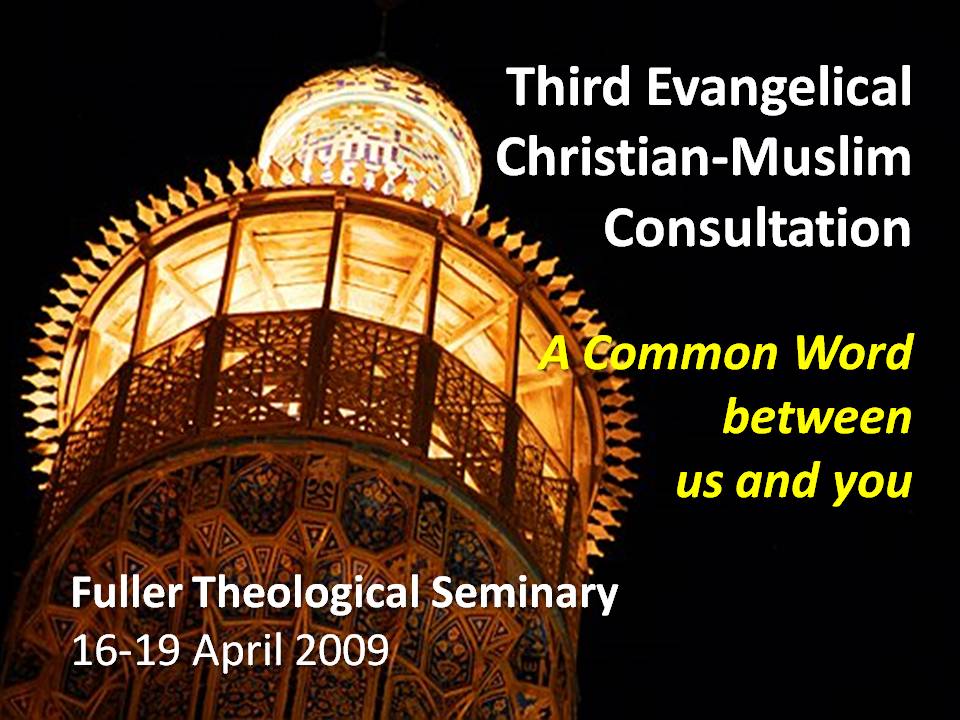 I am at Fuller Theological Seminary participating in the third Evangelical Christian Muslim Conference. The theme is “A Common Word between us and you“. The conference has brought together evangelical and Muslim scholars from many educational institutions, mission agencies and countries to enhance the work of justice and peace.
I am at Fuller Theological Seminary participating in the third Evangelical Christian Muslim Conference. The theme is “A Common Word between us and you“. The conference has brought together evangelical and Muslim scholars from many educational institutions, mission agencies and countries to enhance the work of justice and peace.

 The launch in the UK and Ireland of the Fellowship of Confessing Anglicans (FCA), the orthodox Anglican movement for mission at global and local level, is to take place on July 6 in London.
The launch in the UK and Ireland of the Fellowship of Confessing Anglicans (FCA), the orthodox Anglican movement for mission at global and local level, is to take place on July 6 in London. On Good Friday, after our 12:00noon “Hour at the Cross” Service we are offering a simple meal of home-made soup and rolls. At 1:30pm we will be showing the film, “Beyond Gates of Splendor”. It chronicles the events leading up to and following
On Good Friday, after our 12:00noon “Hour at the Cross” Service we are offering a simple meal of home-made soup and rolls. At 1:30pm we will be showing the film, “Beyond Gates of Splendor”. It chronicles the events leading up to and following  Last Saturday Rico Tice of All Soul’s, Langham Place, spoke at two events at Christ Church on “What is Success?”. His short answer is this: ‘failure’ is being successful in things that ultimately don’t matter.
Last Saturday Rico Tice of All Soul’s, Langham Place, spoke at two events at Christ Church on “What is Success?”. His short answer is this: ‘failure’ is being successful in things that ultimately don’t matter. Footballer Gary Lineker has kicked off the latest project by the
Footballer Gary Lineker has kicked off the latest project by the  Matt Sieger has written a brilliant article over at
Matt Sieger has written a brilliant article over at 


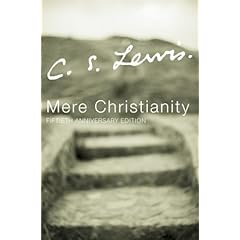 Mere Christianity: C.S. Lewis
Mere Christianity: C.S. Lewis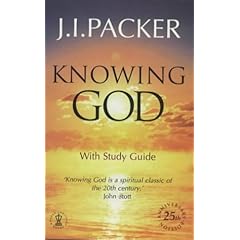 Knowing God: J.I. Packer
Knowing God: J.I. Packer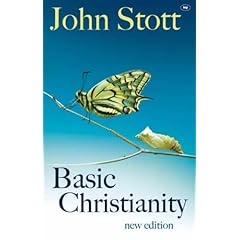 Basic Christianity: John Stott
Basic Christianity: John Stott The Case for Christ: Lee Strobel
The Case for Christ: Lee Strobel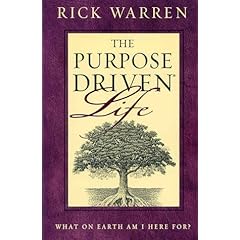 The Purpose Driven Life: Rick Warren
The Purpose Driven Life: Rick Warren Today’s New International Version (TNIV) Study Bible
Today’s New International Version (TNIV) Study Bible The English Standard Version (ESV) Study Bible
The English Standard Version (ESV) Study Bible